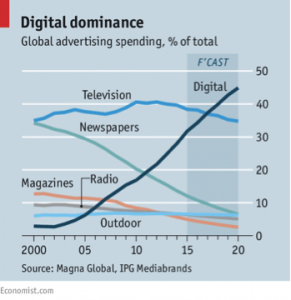 *
*
The article “Invisible ads, phantom readers” discusses online advertisements and their strategies used to target consumers across the Internet. Companies are now spending more money than ever in order to parade their target consumer with advertisements relative to them. Online ads look to be continuously increasing within the Internet market, and it is now a key factor for distribution of various products and services.
Although this article shows little insight towards a point of view, one argument in particular is portrayed when the author claims “TubeMogul, a provider of ad-buying software, has a new advertising campaign claiming that Google has excessive power.” This argument portrays how Google is basically the king of this online marketing industry, and it is difficult for other Internet based companies to compete at this rate.
Evidently theses advertisements are not enjoyable for the average internet user, being that they cost time and interfere with their use of particular websites. An example of this would be the time wasted when https://www.youtube.com/ requires internet consumers to watch up to a 30 second ad for videos as short as two minutes. Yet these ads are necessary in order to create a consistent stream of revenue for countless free sites online.
The primary factor as to why Internet ads are continuously growing in popularity is simply due to the globalization of the Internet. As the popularity of the Internet expands, so does everything involved with it, especially online companies. So, in order to popularize their companies, websites are willing to bid on the privacy and search results of nearly all Internet users. This essentially allows them to specialize their ads for each specific user in order to attract the users interest to their website.
 **
**
Internet databases should not have the right to sell information to various advertising companies. While this occurs, it is an invasion of the users privacy being that they have access to everything individuals research on the Internet, which should be illegal.
Although it is beneficial for targeting consumers best suited for their market, the steps Internet databases must encounter, in order for the advertisements to occur, are a violation of the users privacy. Although it is difficult to determine a solution that allows all around contentment, perhaps the government could invoke laws or even taxes on privacy that limit these databases access to this mass amount of information.
Taxes would likely reduce the amount of advertisements Internet databases are permitted to parade the consumer with. Eventually, as there would be fewer advertisements, websites would only portray ads that would be in the users best interests and the user would likely devote much more attention to these less frequent ads.
Word count: 444
Source:
http://www.economist.com/news/business/21695388-worries-about-fraud-and-fragmentation-may-prompt-shake-out-crowded-online-ad
Image 1(*):
Dave Simonds. Ad Block. N.d. The Economist. Web. 2 Oct. 2016. <http://www.economist.com/news/business/21695388-worries-about-fraud- and-fragmentation-may-prompt-shake-out-crowded-online-ad>.
Image 2(**)
Digital Dominance. N.d. The Economist. Web. 2 Oct. 2016. <http://www.economist.com/news/business/21695388-worries-about-fraud-and-fragmentation-may-prompt-shake-out-crowded-online-ad>.
